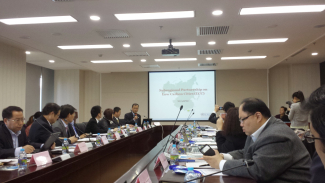International Symposium on “Realizing Low Carbon Cities in North-East Asia"

The International Symposium was jointly organized by UNESCAP East and North-East Asia Office and the Chinese Academy of Social Sciences to review and discuss key issues on low carbon city (LCC) development in the subregion, and to exchange views on the potential of forming a subregional LCC partnership network.
The symposium and the workshop came to the conclusion on the need to launch a cooperation partnership for information sharing and capacity building, as practical means to address the needs expressed by countries and to support city initiatives in moving towards low carbon pathway.
Opening remarks
- Jiahua Pan, General Director, Institute for Urban and Environmental Studies, Chinese Academy of Social Sciences (CASS IUE)
- Sangmin Nam, Deputy Director, UNESCAP East and North-East Asia Office (ENEA)
Moderator: Jiahua Pan, General Director, Institute for Urban and Environmental Studies, Chinese Academy of Social Sciences (CASS IUE)
Presentations and discussions on roles of stakeholders including local governments, the private sector, NGOs and citizens in the low carbon development; as well as roles of policy, tools and framework on stimulating low carbon city development
- Jiahua Pan, General Director, Institute for Urban and Environmental Studies, Chinese Academy of Social Sciences (CASS IUE)
- Kwang-ik Wang, Associate Research Fellow, Korean Research Institute for Human Settlement (KRIHS)
- Yan Peng, East Asia Regional Director, C40
- Manu Mathai, Research Fellow, United Nations University (UNU) Q&A
Moderator: Sangmin Nam, Deputy Director, UNESCAP East and North-East Asia Office (ENEA)
Presentations and discussions on how to facilitate low carbon city development from the technological perspective, such as methodology of low carbon inventory, assessments, standards, compliance and evaluation
- Guiyang Zhuang, Senior Researcher, Institute for Urban and Environmental Studies, Chinese Academy of Social Sciences (CASS,IUE)
- Woon Soo Kim, Senior Research Fellow, Seoul Institute
- Zhigao Wang, Program Manager, China Sustainable Energy Program, Energy Foundation
- Xiaoqian Jiang, Research Analyst, World Resource Institute (WRI)
Moderator: Yuebing Lu, Vice Chairman, Siguler Guff China Funds
Discussions on the needs of low carbon city development to establish more innovative, efficient and sustainable finance mechanisms in order to mobilize private capital. This session will discuss how to adopt policy and tools for meeting financial needs of low carbon city development
- Yuebing Lu, Vice Chairman, Siguler Guff China Funds
- Armstrong Chen, Deputy Director, Banking Innovative Supervisory Department, China Banking Regulatory Commission (CBRC)
- Renato Roldao, Senior Managing Consultant, ICF International
- Fan Zhang, General Director, Hunan Lianchuang Low Carbon Development Center Q&A
Topics of discussions:
- What are the existing networks and their roles? Is there a need for a subregional network?
- What role(s) can a subregional network play and the value-added by this network to the on-going work in this area?
- Who are the target members and key partners of this network and the nature of the network’s operation (e.g. facilitate communications, research, policy-making, funding opportunities, etc)
- Key potential opportunities/ activities that this network can help explore
Lead Discussants:
- Xiang Yu, Researcher, Institute for Urban and Environmental Studies, Chinese Academy of Social Sciences (CASS,IUE)
- Kwang-ik Wang, Associate Research Fellow, Korean Research Institute for Human Settlement (KRIHS)
- Takuya Togawa, Research Associate, National Institute of Environmental Studies (NIES), Japan
 Back to Meetings
Back to Meetings